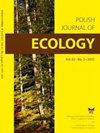Plant Functional Trait Response to Habitat Change and Grazing in a Semiarid Grassland: Unravelling Species Turnover and Intraspecific Variation Effects
IF 0.7
4区 环境科学与生态学
Q4 ECOLOGY
引用次数: 4
Abstract
Plant community assembly is determined by species turnover and intraspecific trait variations (ITV) controlled by environment changes. However, little is known about how species turnover and ITV affect the responses of plant community to habitat changes and grazing disturbance in semiarid grasslands. Here, we measured five functional plant traits in four typical grassland habitats under fencing and grazing disturbance in a semiarid grassland, Northern China, including plant height, specific leaf area (SLA), leaf dry matter content (LDMC), leaf nitrogen content (LNC) and leaf carbon: nitrogen ratio (C:N). We also calculated the community weighted means (CWM) and non-weighted means (CM) of all traits and examined the relative roles of species turnover and ITV in affecting the responses of community traits to habitat changes and grazing disturbance. Our results showed that the CWM and CM values of five functional traits differed with grassland habitat changes. As compared to other grasslands, the Stipa steppe had the higher plant height, the sandy grassland had the higher SLA and lower LDMC, and the meadow had the lower LNC and higher C:N. Grazing decreased plant height across grassland habitats, as well as decreased SLA and increased LDMC in meadow. The responses of all community-level traits to habitat changes were driven by species turnover, while the responses of phenotypic traits (height, SLA and LDMC) to grazing were determined by both species turnover and ITV. So, we argue that ITV should be considered when understanding plant community assembly under grazing disturbance regime in semiarid grasslands.半干旱草原植物功能性状对生境变化和放牧的响应:揭示物种更替和种内变异效应
植物群落的聚集是由物种更替和受环境变化控制的种内性状变异(ITV)决定的。然而,对于半干旱草原植物群落对生境变化和放牧干扰的响应,物种更替和ITV的影响机制尚不清楚。本文以中国北方半干旱草原为研究对象,测量了围栏和放牧干扰下4种典型草地生境植物的5个功能性状,包括株高、比叶面积(SLA)、叶片干物质含量(LDMC)、叶片氮含量(LNC)和碳氮比(C:N)。计算了各性状的群落加权平均值(CWM)和非加权平均值(CM),探讨了物种更替和独立度对群落性状对生境变化和放牧干扰响应的影响。结果表明,5个功能性状的CWM和CM值随草地生境的变化而不同。与其他草地相比,针茅草原的株高较高,沙质草地的SLA较高,LDMC较低,草甸的LNC较低,C:N较高。放牧降低了各生境的植物高度,降低了草甸的SLA,增加了LDMC。群落水平性状对生境变化的响应主要由物种更替驱动,而表型性状(高度、SLA和LDMC)对放牧的响应主要由物种更替和独立度共同决定。因此,我们认为,在了解半干旱草原放牧干扰下的植物群落聚集时,应考虑ITV。
本文章由计算机程序翻译,如有差异,请以英文原文为准。
求助全文
约1分钟内获得全文
求助全文
来源期刊

Polish Journal of Ecology
环境科学-生态学
CiteScore
1.10
自引率
0.00%
发文量
9
审稿时长
18-36 weeks
期刊介绍:
POLISH JOURNAL OF ECOLOGY (formerly Ekologia polska) publishes original scientific research papers dealing with all aspects of ecology: both fundamental and applied, physiological ecology, evolutionary ecology, ecology of population, community, ecosystem, landscape as well as global ecology. There is no bias regarding taxons, ecosystems or geographical regions.
 求助内容:
求助内容: 应助结果提醒方式:
应助结果提醒方式:


